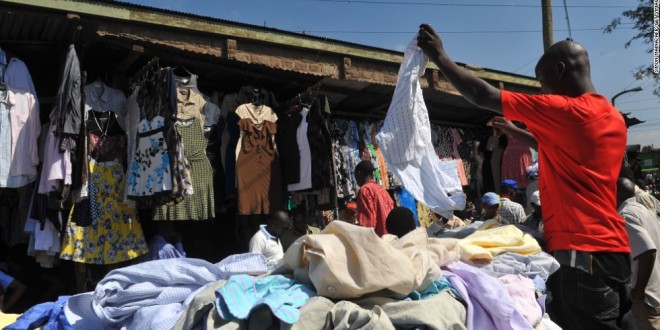
THOUSANDS of people will be left without any source of livelihood if government goes ahead with its plans to ban the importation of second-hand clothes.
BY OBEY MANAYITI/VICTORIA MTOMBA
National Vendors Union of Zimbabwe (Navuz) director, Samuel Wadzai said it was strange and shocking that government intended to ban an informal business that was sustaining the lives of thousands of people. “Most of our members are involved in selling second-hand clothes because they are on demand and are easy to obtain,” Wadzai said. “The government must review this position, otherwise the livelihoods of thousands of our members will be destroyed.”
The Poverty Reduction Forum Trust described as unfortunate and ill-timed the decision by Finance minister Patrick Chinamasa to ban the sale of second hand clothes saying government had lost touch with reality.
PRFT executive director Judith Kaulem said although it may not be dignifying for people to wear second hand clothes, the economic reality in Zimbabwe did not give people any choices.
“Most people depend on the sale of second hand clothes. It is good to promote local industry but we don’t have any company producing affordable clothes in Zimbabwe at the moment,” Kaulem said.
“You don’t close the only channel without opening an alternative. Our reality is that those industries which we seek to promote are not there. Banning second hand clothes is going to make people’s lives difficult. I don’t think this was a good idea. People opted for second hand clothes because they don’t have enough income. The economy must be fixed first.”
Second hand clothes mostly come into the country through the Mutare Mozambique border and are sold at very low prices.
- Chamisa under fire over US$120K donation
- Mavhunga puts DeMbare into Chibuku quarterfinals
- Pension funds bet on Cabora Bassa oilfields
- Councils defy govt fire tender directive
Keep Reading
“There are no jobs and people are not being paid these days. I went into the business of importing second hand clothes from Mozambique because I had no other means to feed my family. Business is going on well for me and I hope the government will adjust its position,” said James Matiza of Harare.
Others warned that criminalizing the sale of second hand clothes would create corruption from the border to the selling point.
“We will smuggle bales of second hand clothes and it will be a cat and mouse game with the police. Instead of criminalizing second hand clothes, government should find mechanisms to embrace them and regularize their sale,” said Joice Sithole.
However the Zimbabwe Clothing Manufacturers Association said it was operating at an average of 45% and was hoping to improve if working capital of $5 million was availed to the sector.
The association’s chairman Jeremy Youmans said the local clothing sector was dying because it was failing to compete with second hand clothes.
“Our products are not cheap but we produce good products that are competitive as some of our companies exports to other countries,” he said.
Youmans said the banning of second hand clothes was welcome to the sector.
A local brokerage firm said the ban of second hand clothes was meant to protect the local clothing companies such as Truworths and Edgars and urged players to manufacture affordable products.
“We believe if they are able to provide the very low-end with decent clothing at reasonable prices, they stand to witness a surge in their revenues,” said ABC Stockbrokers.
Zimbabwe Revenue Authority commissioner general Gershem Pasi told Parliament recently that taxation on clothing was too high prompting people buy second-hand clothes.











